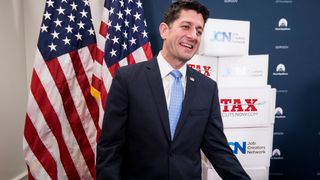Ronald Reagan was the last US president to pass comprehensive tax reform. Reagan worked with both parties in Congress to achieve broad bipartisan support for the Tax Reform Act of 1986.
While the current crop of Republicans lionise Reagan, President Trump and his congressional counterparts are trying to ram through a highly partisan comprehensive tax reform package before Christmas. Last week, the House of Representatives passed the ‘Tax Cuts and Jobs Act’ by a relatively narrow margin (227 – 205). All 192 present House Democrats voted ‘Nay’.
The bill proposes a major cut in the corporate tax rate (from 35 per cent to 20 per cent), a tax cut for upper and middle-income Americans, and a simplification of the current seven tax brackets into four. Nonpartisan analysis from both the Congressional Budget Office and Tax Policy Centre show that by 2021, the bill would increase the tax burden for households making $10,000 to $30,000 per year and increase the deficit over the next 10 years by roughly $1.5 trillion.
Republicans need a win. The party controls the White House and both houses of Congress, but they failed to repeal and replace Obamacare and have not yet delivered a major legislative achievement. The Republican base and their donors are growing increasingly frustrated.
The longer the Republican tax bill is in the spotlight, the harder it will be to achieve the legislative win craved by Trump, McConnell, and Paul Ryan.
The road ahead on tax reform is politically perilous. The bill is currently under amendment in the Senate, where all 48 Democrats are united in opposition to this Republican tax reform package. So Senate Majority Leader Mitch McConnell can afford no more than two ‘Nay’ votes from the 52-member Republican conference. Wisconsin’s Ron Johnson opposes the bill in its current format, while his Republican colleagues Susan Collins, Bob Corker and John McCain have all voiced doubts.
A further complication is the 12 December special Senate election in Alabama, where Republican candidate Roy Moore faces multiple accusations of sexual misconduct with minors. Birmingham News, Alabama’s largest newspaper, has opposed Moore’s candidacy, and a poll commissioned by the National Republican Senatorial Committee showed Moore trailing Democrat Doug Jones by 12 points. If Jones manages to beat Moore in one of the most consistently Republican states in America, McConnell’s margin for error will shrink even further.
The longer the Republican tax bill is in the spotlight, the harder it will be to achieve the legislative win craved by Trump, McConnell, and Paul Ryan. Polls show that the American people oppose the bill by a 2-1 margin, but three-quarters of Republicans say it will help them financially.
“We’ve got a long road ahead of us,” said Speaker Ryan after the tax reform bill passed the House. The push for tax reform will sap Republicans’ energy for weeks and probably months to come. And if the effort fails, there will be a lot of angry Republican voters and donors.






